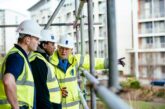
The Reverend Kevin Fear, CITB‘s health and safety policy lead, on how the construction industry and building trades can support their mental health.
So far there has been little in the way of ‘health and safety gone mad!’ responses to the government’s actions to prevent the spread of COVID-19.
The steps the government has introduced are the results of health and safety risk assessments, and never has there been so much talk of PPE or a willingness to wear it.
But the Health and Safety at Work Act requires employers to ensure not only the health and safety of employees but also their wellbeing. The COVID-19 guidelines give no advice about how to ensure this, and more specifically how to promote positive mental health within the workforce during these difficult times.
On the other side, sites that follow the government guidelines create environments where workers know their wellbeing is valued. Many of those on site work for small companies or may be self-employed. Right now, having work and financial security while feeling that everything is being done to provide adequate health protection will go some way to promote positive mental health.
Taking action
There is more that can be done: having a clear plan and communicating this to workers; daily briefings to remind everyone of the protective measures; spotting when someone is not coping, and providing them with assistance; showing compassion and understanding; all these measures can help with workforce mental health and wellbeing.
In terms of day-to-day measures that everyone in construction can take to look after their mental health, these can vary with individually, but general points include staying active beyond simply the job on site; drinking sensibly; eating healthily.
There will be those who are also caring for children at home or looking after someone who is vulnerable – flexibility around this from supervisors, particularly during the current crisis with schools closed, can achieve a better work-life balance.
CITB has funded the training of thousands of construction industry workers in mental health first aid and the Fairness, Inclusion and Respect programme to help improve industry culture for a healthier workforce. But not everyone is comfortable talking about mental health at work, so the Lighthouse Club, a charity dedicated to the wellbeing of construction workers and their families, has created a helpline app which you can download here. If you are in an immediate crisis call the Construction Industry Helpline on 0345 605 1956 or the Samaritans free on 116 123.
Furloughing and mental health
While there are many who are self-employed, a considerable number of those directly employed will have been furloughed. They will be facing different challenges: here, managers and supervisors can make extra efforts to keep in touch, not to talk about work, but to just make sure that they are all right and that they know where they can get ongoing support, perhaps from HR or from employee assistance programmes.
I discussed some of these issues during an Association for Project Safety webinar on mental health in construction here.
Finally, in the time BC (before COVID-19), the construction industry already had high levels of poor mental health and suicide. I hope and pray, literally, that when we get to AD (after discharge) we will not be seeing evidence that the stress and anxiety of this time just proved too much for some.
Building Mental Health is also an industry resource that provides further tools for employers who wish to improve the mental health provision for their employees.







